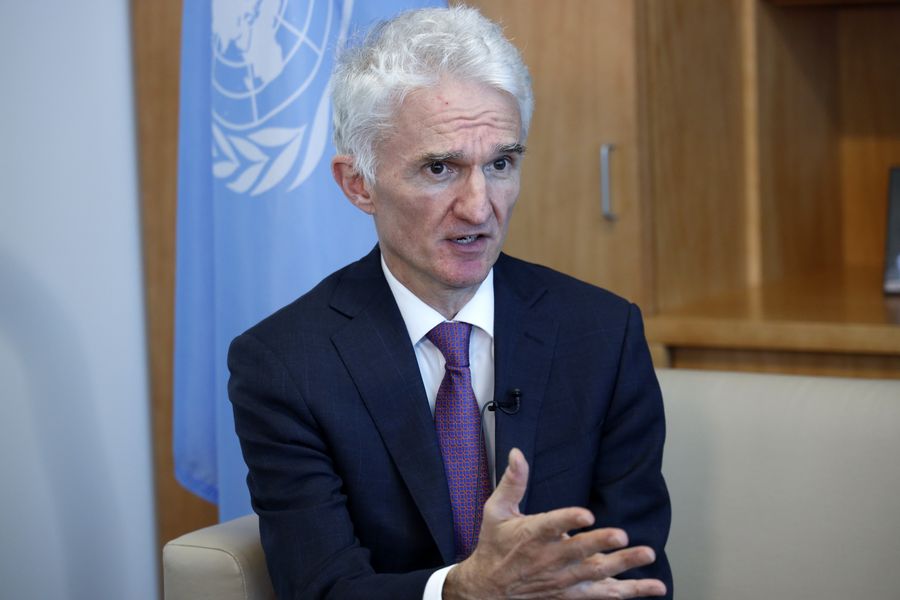

"This is really a classic example of a case where everybody's interests are best served by collaboration. And everybody needs to recognize the remarkable efforts that China is making to deal with this problem," UN humanitarian chief Mark Lowcock said.

United Nations Undersecretary-General for Humanitarian Affairs and Emergency Relief Coordinator Mark Lowcock speaks in an interview with Xinhua at the UN headquarters in New York, Feb. 13, 2020. (Xinhua/Li Muzi)
China's response to the novel coronavirus outbreak is remarkable and the international community shares a common interest in collaborating to tackle the epidemic, UN Undersecretary-General for Humanitarian Affairs and Emergency Relief Coordinator Mark Lowcock has told Xinhua.
Commenting on the measures China has taken to combat the epidemic, Lowcock lauded the country's "quite wide agreement" to try to first of all "contain the virus and its spread."
Lots of the measures that have been taken are intended to have that effect inside China, he said.
Lowcock also lauded China's efforts to prevent the spread of the novel coronavirus beyond China, adding that China is taking efforts to "buy time to learn more about the virus and how to deal with it."

A staff member disinfects the administrative area of the construction site of China Eastern Airlines' production auxiliary area (phase one) in Chengdu Tianfu International Airport in Chengdu, southwest China's Sichuan Province, Feb. 11, 2020. (Photo by Xu Bingjie/Xinhua)
"The secretary-general, the head of the World Health Organization, and all the senior colleagues in the United Nations really admire the way China is trying to deal with this problem," he added.
The UN official also called for global cooperation to tackle the epidemic.
"This is really a classic example of a case where everybody's interests are best served by collaboration. And everybody needs to recognize the remarkable efforts that China is making to deal with this problem," he said.
Commenting on the appeal made by Zhang Jun, China's permanent representative to the United Nations, on Wednesday that the international community should "increase mutual trust, foster an awareness of a community of shared future for mankind, oppose politicization of health issues and leave no breeding ground or space for any racist comments, discrimination or stigma," Lowcock said those were "extremely wise words."
"They fully represent the view of the United Nations that the virus does not respect borders. The virus does not discriminate between one sort of person and another sort of person. The virus has the potential to affect everybody," he said.
"We need to understand the virus, and then we need to develop a means of diagnosing people who may have it," said Lowcock, adding that one of the priorities is to see what can be done to develop new therapies.

 Award-winning photos show poverty reduction achievements in NE China's Jilin province
Award-winning photos show poverty reduction achievements in NE China's Jilin province People dance to greet advent of New Year in Ameiqituo Town, Guizhou
People dance to greet advent of New Year in Ameiqituo Town, Guizhou Fire brigade in Shanghai holds group wedding
Fire brigade in Shanghai holds group wedding Tourists enjoy ice sculptures in Datan Town, north China
Tourists enjoy ice sculptures in Datan Town, north China Sunset scenery of Dayan Pagoda in Xi'an
Sunset scenery of Dayan Pagoda in Xi'an Tourists have fun at scenic spot in Nanlong Town, NW China
Tourists have fun at scenic spot in Nanlong Town, NW China Harbin attracts tourists by making best use of ice in winter
Harbin attracts tourists by making best use of ice in winter In pics: FIS Alpine Ski Women's World Cup Slalom
In pics: FIS Alpine Ski Women's World Cup Slalom Black-necked cranes rest at reservoir in Lhunzhub County, Lhasa
Black-necked cranes rest at reservoir in Lhunzhub County, Lhasa China's FAST telescope will be available to foreign scientists in April
China's FAST telescope will be available to foreign scientists in April